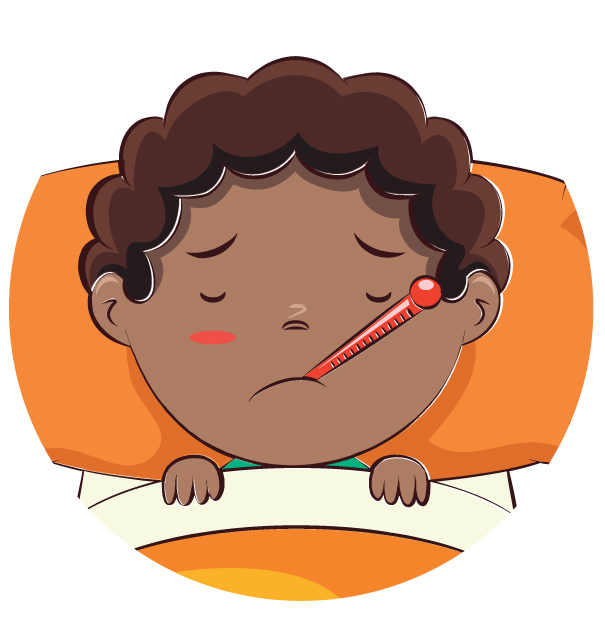Flu: A guide for parents of children or adolescents with chronic health conditions

Influenza (flu) is a contagious respiratory illness cause by influenza viruses that infect the nose, throat, and lungs. It can cause mild to severe illness, and at times complications from flu can lead to hospital stays and death. Children younger than 5, but especially children younger than 2 years old, and children and adolescents with certain chronic health conditions are at increased risk of developing serious flu complications. The best way to reduce the risk of flu and its potentially serious complications is to get a flu vaccine each year.
How do I know if my child’s medical condition puts them at higher risk of developing serious flu complications?
A child of any age is at higher risk of flu complications if they have any of the following chronic health conditions:

- Asthma
- Neurologic and neurodevelopment conditions [including disorders of the brain, spinal cord, peripheral nerve and muscle, such as cerebral palsy, epilepsy (seizure disorders), stroke, intellectual disability (mental retardation), moderate to severe developmental delay, muscular dystrophy, or spinal cord injury]
- Chronic lung disease (such as cystic fibrosis)
- Heart disease (such as congenital heart disease, congestive heart failure and coronary artery disease
- Blood disorders (such as sickle cell disease)
- Endocrine disorders (such as diabetes mellitus)
- Kidney disorders
- Liver disorders
- Metabolic disorders (such as inherited metabolic disorders and mitochondrial disorders)
- Weakened immune system due to disease or medication (such as children or adolescents with HIV or AIDS, cancer, or those on chronic steroids)
- Children who are taking aspirin or salicylate-containing medicines
- Extreme obesity, which has been associated with severe influenza illness in some studies of adults, may also be a risk factor for children. Childhood obesity is defined as a body mass index (BMI) at or above the 95th percentile, for age and sex.
What are signs and symptoms of flu?
Signs and symptoms of flu can include fever, cough, sore throat, runny or stuffy nose, muscle or body aches, headaches, feeling feverish/chills, fatigue (tiredness), and sometimes children may also have vomiting and diarrhea. It is important to note that some children who are sick with flu may not have a fever.
What is a flu complication?
Most children who get flu will recover in a few days to less than 2 weeks, but some people will develop complications (health problems such as pneumonia) as a result of flu, some of which can be life-threatening.
Pneumonia, sinusitis, and ear infections are 3 examples of complications from flu. Flu also can make certain chronic health conditions worse. For example, people with asthma may experience asthma attacks while they have flu.
How can I protect my child against flu?
The most important thing is for your child to get a flu vaccine every year. Children younger than 6 months old are at higher risk of serious flu illness, but are too young to be vaccinated. People who care for them and all household members aged 6 months and older should be vaccinated.
In addition to getting a flu vaccine, you and your child should take everyday actions to help prevent the spread of germs.
- Stay away from people who are sick as much as possible to keep from getting sick yourself. If you or your child are sick, avoid others as much as possible to keep from infecting them.
- Remember to regularly cover your coughs and sneezes, wash your hands often, avoid touching your eyes, nose and mouth, and clean surfaces that may be contaminated with flu viruses.
These everyday actions can help reduce your chances of getting sick and prevent the spread of germs to others if you are sick. However, a yearly flu vaccine is the best way to prevent flu illness.

- Seek medical care: Call or take your child with chronic health conditions to a medical provider as soon as possible if your child develops flu symptoms—they may want to begin treatment with a flu antiviral drug. Antiviral drugs are prescription medicines that fight against flu in your body. Antiviral treatment works best when started soon after flu illness begins, so don’t delay in contacting your child’s health care provider if they have symptoms that might be caused by flu.
- Stay at home: Keep your child at home, except for medical visits, until your child’s fever is gone for at least 24 hours (without the use of fever-reducing medications).
- Cover coughs: Ensure that your child covers coughs and sneezes.
- Encourage rest and fluids: Make sure your child gets plenty of rest and drinks fluids to keep from becoming dehydrated.
- Ask about medicines: Ask your medical provider about fever-reducing medicines based on your child’s age. Children younger than 4 years old should not be given over-the-counter cold or cough medicines without approval from a health care provider. Aspirin should not be given to children or teenagers who have flu; this can cause a rare but serious illness called Reye syndrome.
- Protect those at higher risk of flu complications: Pregnant people, adults 65 years and older, and people with immunosuppression or chronic health conditions are at higher risk for flu complications, and should get a flu shot as the best protection against flu. If possible, those who are at higher risk should not be the main caregiver of a child with flu. Additionally, infants younger than 6 months old are too young to be vaccinated. The best way to protect infants is to make sure the people around them are vaccinated.
If your child is experiencing any of the following emergency warning signs, you should take them to the emergency room:

- Fast breathing or trouble breathing
- Bluish lips or face
- Ribs pulling in with each breath
- Chest pain
- Severe muscle pain (child refuses to walk)
- Dehydration (no urine for 8 hours, dry mouth, no tears when crying)
- Not alert or interacting when awake
- Seizures
- Fever above 104° F
- In children younger than 12 weeks, any fever
- Fever or cough that improve but then return or worsen
- Worsening of chronic medical conditions
When can my child go back to school after being sick with flu?
- Your child should stay home for at least 24 hours after their fever is gone.
- The fever should be gone without the use of a fever-reducing medicine, such as acetaminophen or ibuprofen.
- A fever is defined as 100 F/37.8° C or greater*
*Many authorities use either 100 (37.8 degrees Celsius) or 100.4 F (38.0 degrees Celsius) as a cut-off for fever, but this number can vary depending on factors such as the method of measurement and the age of the person.
Is a flu vaccine safe for my child with chronic health problems?
Yes. Flu vaccines have an excellent safety record and a number of them are approved for use in children older than 6 months, including healthy children and children with certain chronic health conditions. Because children with chronic health conditions are at increased risk of getting flu related complications, it is especially important that they get vaccinated.
CDC recommends that all children 6 months and older, especially those with chronic health conditions, get a seasonal flu vaccine every year.
For more information,
visit www.cdc.gov/flu
or call 800-CDC-INFO
What flu vaccine should my child get and how many doses?
In general, children with chronic medical conditions should get a flu shot rather than a nasal spray flu vaccine. Your health care provider can help choose the best vaccine option. Additionally, children younger than 9 years old may need 2 doses of the vaccine if they have not received two doses of the vaccine in the past. Talk with your health care provider to discuss how many doses are recommended for your child.
How can I plan ahead with my child’s school or child care?
Find out your child’s school or childcare providers plan for flu season. Let them know your child is at higher risk for flu-related problems.


